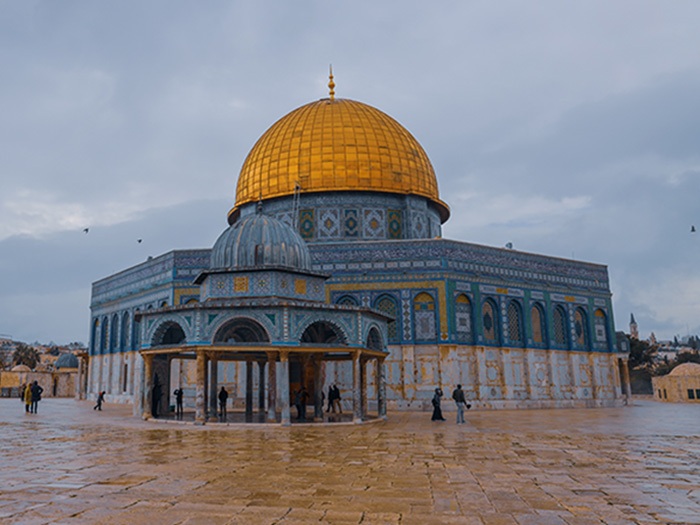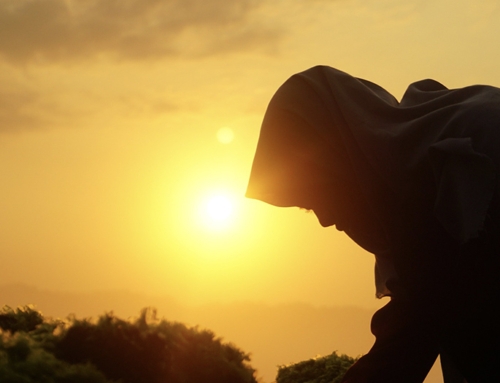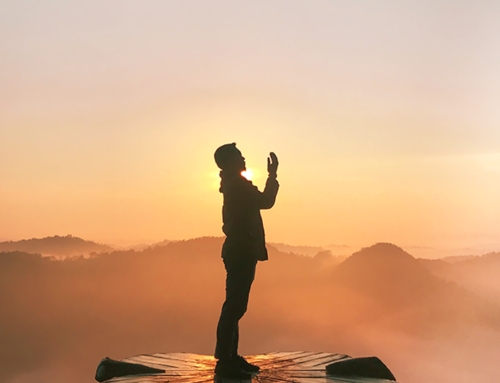For Muslims worldwide, Jerusalem occupies a central, vital place in their faith and collective imagination. Known as Al-Quds or Bayt al-Maqdis in Arabic, this holy city contains sites of immense religious significance for Muslims around the world. Understanding Jerusalem’s spiritual symbolism, rich history, and modern significance helps underscore why it remains so revered for Muslims across the world today.
Sacred Sites and the Revelatory Night Journey
In Islam, Jerusalem hosts supremely sacred sites tied to the Prophet Muhammad’s, peace be upon him, miraculous Night Journey described in the Quran and Hadith. During this journey, the Prophet Muhammad, peace be upon him, was transported from Mecca to the “Farthest Mosque”, from where he ascended through the heavens, witnessed wonders, and received instructions from God, specifically on the number of daily prayers.
This “Farthest Mosque” is identified as the Noble Sanctuary area in Jerusalem’s walled Old City, where the Dome of the Rock shrine and Al-Aqsa Mosque now stand. During this journey, the Prophet Muhammad, peace be upon him, led all earlier Prophets in prayer. Muslims regard his leading them in prayer before his heavenly ascent as a further fact that makes Jerusalem a blessed sanctuary. The area is thus understood as tying past scriptural prophets and miracles to Islam’s final Prophet, helping cement its sanctity for Muslims. The Prophet Muhammad, peace be upon him, was the final messenger among a line of Prophets, his leading them in prayer symbolized passing the torch from Moses and Jesus to Muhammad, peace be upon them all.
Enduring Legacy Under Islamic Rule
Besides scriptural significance, Jerusalem also acquired vital importance from its history as a seat of Muslim religious and political authority in the region for over a millennium.
After the death of the Prophet Muhammad, peace be upon him, in 632 CE, the second Muslim Caliph or leader, Umar Ibn Al-Khattab, conquered Jerusalem by a peaceful treaty from the Byzantines in 637 CE. Instead of retribution against rival faiths, Umar adopted a policy of religious tolerance by assuring rights and safety for Christian residents, thereby transforming Jerusalem into an open, pluralistic city attracting diverse communities of Muslims, Christians, and Jews.
Umar’s example would be followed by subsequent Muslim rulers of Jerusalem, making it a model of interfaith coexistence unmatched in Europe at the time. Over ensuing centuries of stable Islamic rule, the city blossomed into a flourishing center of religion, culture, and trade. Evolving powerful Muslim dynasties like the Umayyads, Abbasids, and Fatimids constructed architectural masterpieces, prime amongst them the exquisite golden-domed mosque of the Dome of the Rock, cementing Islam’s enduring stamp on Jerusalem.
Even during the Crusades when it was temporarily lost, Muslims zealously fought to regain Jerusalem given its political and religious capital. After Salah al-Din’s recapture of the city in 1187 CE and under various Turkish, Arab, and Ottoman Muslim rulers until World War I, Islamic Jerusalem persisted as a seat of regional governance with its religious monuments continuing to attract Muslim pilgrims.
When Salah al-Din decisively retook Jerusalem from Crusader control in 1187 CE, he upheld the tradition set by the Caliph Umar in 637CE of protecting the rights of minority faiths. Rather than expelling the city’s Christian and Jewish inhabitants after his bloody triumph, he invited Jews to return and settle in Jerusalem to help bolster the population from emigration prompted by the Crusades.
Salah al-Din also entered agreements with the city’s Christian clergy, allowing them freedom of worship. His relative tolerance extended the atmosphere of religious pluralism that had historically prevailed under benign Muslim rule in stark contrast to the persecution of Jews and Muslims carried out by the intolerant Crusaders. By enabling peaceful coexistence between faiths, Salah al-Din embodied tolerant Islamic teachings and implemented them in Jerusalem, further solidifying enduring legitimacy among Muslims.
The enduring reality of Jerusalem as an axis for Muslim political power and prestige for nearly 1400 years further illuminates why Muslims until today see it as second only to Mecca and Medina in sanctity.
Though the Crusades interrupted Muslim rule periodically, Jerusalem mostly retained its Islamic character – bespeaking a legacy still evident through the Old City’s mosques, architecture, culture, and demographics. Various Turkish and Arab Muslim regimes administering Palestine regarded Jerusalem as a regional capital down to the 20th century. These enduring religious and political traces reinforce Jerusalem’s cherished identity for Muslims worldwide.
While Salah al-Din’s example reflected inclusive Islamic protection of diversity, current issues are seen by many Muslims as exposing an intolerance towards non-Jewish religious expression under Israeli authority over the Holy City and Al-Aqsa Mosque. Israel’s injustice against the Palestinians curbs the ability of not only Muslims, but even Palestinian Christians to freely worship at churches in Jerusalem holy to their faith, like the Church of the Holy Sepulchre – denying to them what was historically accessible under Islamic administrations of the city.
Rather than permitting peaceable worship and access by all faiths as practiced by past Muslim administrations, Israel’s rule over Jerusalem is regarded by many Muslims and even Palestinian Christians as infringing on religious freedom and denying access to holy sites in the city held sacred by Muslims, Christians, and Jews for centuries.
Modern Aspirations and Symbolism
In current times, religious resurgence and complex sociopolitical struggles have heightened Jerusalem’s importance for Muslims. As political authority over historic Palestine remains under illegal Israeli occupation, Jerusalem embodies hopes for self-determination and stirs broader Muslim solidarity around its Islamic heritage.
Many Muslims aspire towards bringing back Jerusalem to its former grandeur under enlightened Islamic rule – which enabled harmonious coexistence between various sects of Islam alongside Christians and Jews.
Jerusalem holds high spiritual meaning and stirs immense emotion due to its direct connection to the foundations of Islam. As the holy land where the Prophet Muhammad, peace be upon him, journeyed to during his Night Ascension into the heavens, Jerusalem marks the first direction Muslims prayed towards and its sanctified soil forever links the city to Islam’s very origins. Muslims also believe in all other Prophets who lived in this land, including Abraham, Jacob, Joseph, David, Solomon, and Jesus, peace be upon them all.
Conclusion
Throughout history, Muslim rulers passionately preserved and enhanced Jerusalem’s immense sacredness as a peaceful haven open for worshippers of all faiths. Through openly welcoming Christian and Jewish communities to live safely within the city’s walls, as well as constructing renowned houses of worship like the splendid Dome of the Rock and formidable Al-Aqsa Mosque, Islamic rule transformed Jerusalem into a thriving center of religion and tolerance, where people of multiple faiths could freely seek spiritual fulfillment.
However, present infringements by Israel on the rights of Muslims to pray at al-Aqsa and worship within the Noble Sanctuary stand in stark contrast to the age-old Islamic mandate of facilitating multi-faith harmony that hallmarked compassionate administration of the holy city. Recovering unrestricted access to Islam’s cherished symbols embodied by blessed Jerusalem to restore timeless ideals of tolerance and openness remains an urgent priority stirring Muslims worldwide. For Muslims, removing injustices currently taking place in Palestine and Jerusalem infringing upon worship rights in the holy sites carries urgency to restore the city’s heritage of religious tolerance that early Islamic rule had vigilantly instituted since the Prophet Muhammad’s, peace be upon him, blessed night journey there.
Got Questions?
We have Answers. Get in touch now.








